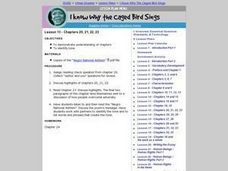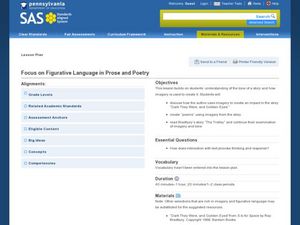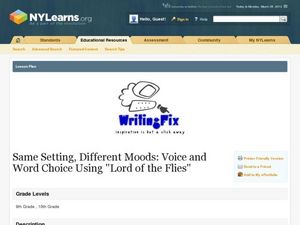Curated OER
Style and Voice
Develop the writing skills of your high school class. Writers consider their personal style and voice, read selections by other authors, and then write pieces that challenge them to experiment with their own style.
Oakland Writes
Exploring Thematic Motifs in The House on Mango Street
Explore identity and community through an expository essay based on The House on Mango Street by Sandra Cisneros. This two-week unit on writing an essay provides a brief description of each day and all of the worksheets and materials you...
Academy of American Poets
Women in Poetry
Imagine linking poetry to technology! Thirty-three lessons comprise a 6-week "Women in Poetry" unit for high schoolers. Class members research women poets, learn how to respond electronically to discussions, write their poems, create web...
Curated OER
Text Elements—Vampires
Students explore the tone and style of passages from horror genre literature. In this literary elements lesson, students read The Vampire by John Stagg and the War of the World script by H.G. Wells, Students write about the way the...
K20 LEARN
It’s Never Too Late to Apologize: Character Development and Theme in “The Scarlet Ibis”
Sometimes saying I'm sorry just doesn't cut it. Scholars examine a series of apology poems, songs, and stories and consider each speaker's regrets. Using what they have learned, they analyze James Hurst's short story, "The Scarlet Ibis,"...
Curated OER
I Know Why the Caged Bird Sings: Chapters 20, 21, 22, 23
Students complete chapter analysis activities for the Maya Angelou's I Know Why the Caged Bird Sings. In this novel analysis lesson, students read and discuss chapters 20, 21, and 22 from the novel. Students then read and listen to the...
Curated OER
The Witch of Goingsnake
Students complete literary analysis and writing activities using The Witch of Goingsnake. In this literary analysis lesson plan, students interpret a proverb, read poems, complete a quaker reading, and complete research for the lesson...
Curated OER
Come On, Rain!
Students read and analyze the story. In this language arts lesson, students read Come on, Rain! and examine how mood and tone are created, the use of figurative language and the characteristics of the genre. Students research the time...
Curated OER
Focus on Figurative Language in Prose and Poetry
Students place emphasis on the use of figurative language when analyzing prose and poetry. In this figurative language lesson, students explore the tone of a story and its imagery. Students read and discuss how the author uses imagery in...
Curated OER
The Adventures of Huckleberry Finn Packet
Readers of The Adventures of Huckleberry Finn are directed to complete two projects as a part of their study of Mark Twain’s novel. Individuals craft an organized notebook containing all their work during the study, and they research...
New York State Education Department
English Language Arts Examination: June 2014
Should companies track consumers' shopping preferences without their permission? Using the resource, scholars write source-based argumentative essays to answer the question. They also answer reading comprehension questions based on an...
Academy of American Poets
Teach This Poem: "Election Day, November, 1884" by Walt Whitman
To begin a study of Walt Whitman's poem, "Election Day, November 1884," learners first call out a word or two that describes their reaction to the recent presidential election. They then read an encyclopedia entry about the Presidential...
Curated OER
To Kill a Mockingbird: End of Novel Critical-Thinking Questions
Chapters 28 – 31 of Harper Lee’s To Kill a Mockingbird are the focus of a series of critical thinking questions. Responders are encouraged to refer directly to the novel to support their inferences and interpretations.
Louisiana Department of Education
Fahrenheit 451
In his 2013 introduction to Fahrenheit 451, Neil Gaiman states, “Fiction is a lie that tells us true things, over and over.” In this extraordinary unit plan, readers "explore the power of written language to educate and influence...
Waunakee Community School District
Identifying Themes in Literature
If your language arts learners have a hard time determining the universal theme of a written work, use a straightforward learning exercise to help them find it. After reviewing a list of common themes, kids note the title, character,...
Monarch High School
TP-CASTT Practice
Acronyms can help learners remember facts and analyze poetry. This resource includes graphic organizers for TP-CASTT, SOAPS, SOAPSTone, and DIDLS. Class members can try out one or all of these strategies to assist with that difficult job...
Curated OER
Post-Colonial Writers Unit
How do cultural and historical background impact thought? To explore this essential question, class members view of portion of the film, The Passage to India, read an excerpt from The Magician’s Nephew, and Nissim Ezekiel’s poem, "In...
Curated OER
Children's Media and Censorship
High schoolers form opinions about children and television censorship after analyzing literature. They complete a journal writing activity to identify the topic and make a list of inappropriate television shows for children. Next, they...
Shoop English
Literature Terms Activity
Designed to be used with an independent reading book, this activity provides practice with identifying and explaining literary terms. While they read, individuals find instances of literary devices and elements in use in their books....
Curated OER
Same Setting, Different Moods: Voice and Word Choice Using Lord of the Flies
Whether it's dark, delightful, or somber, set the mood with William Golding's Lord of the Flies. High-schoolers practice descriptive writing by creating the appropriate mood for an original scene, starring one of the book's main characters.
Maryland Department of Education
The Concept of Identity Lesson 2: The Historical/Biographical Approach
"How does our environment shape our identity?" After researching biographical information about John Knowles and considering how these experiences are reflected in A Separate Peace, class members consider the strengths and weaknesses of...
CPALMS
Analyzing Vonnegut's View of the Future and His Commentary on the Present in Harrison Bergeron
Kurt Vonnegut's short story "Harrison Bergeron" engages adolescents with its theme about the dangers of complete societal equality. Learners complete a graphic organizer to track literary elements in the story, as well as an inference...
Curated OER
Oliver Twist Goes to Hollywood
How does Oliver Twist, the novel written by Charles Dickens, compare with its screenplay adaptation? Although the activity doesn't require learners to have read the novel, the similarities and differences of the highlighted passages...
Curated OER
A Modest Proposal: Irony Made Understandable with Rock and Roll
Who doesn't love music? Poems and songs will engage your high school class in a discussion about irony. Use songs like "Rockin' in the Free World" or "Born in the U.S.A." to illustrate the ironic point of view. Print the lyrics so...
Other popular searches
- Author's Tone and Mood
- Authors Tone and Mood
- Teaching Author's Tone
- Reading Authors Tone
- Analyzing Author's Tone
- Authors Tone and Voice
- Author's Tone and Style
- Understand the Author's Tone
- Authors Tone Powerpoint
- Writing Author's Tone

























